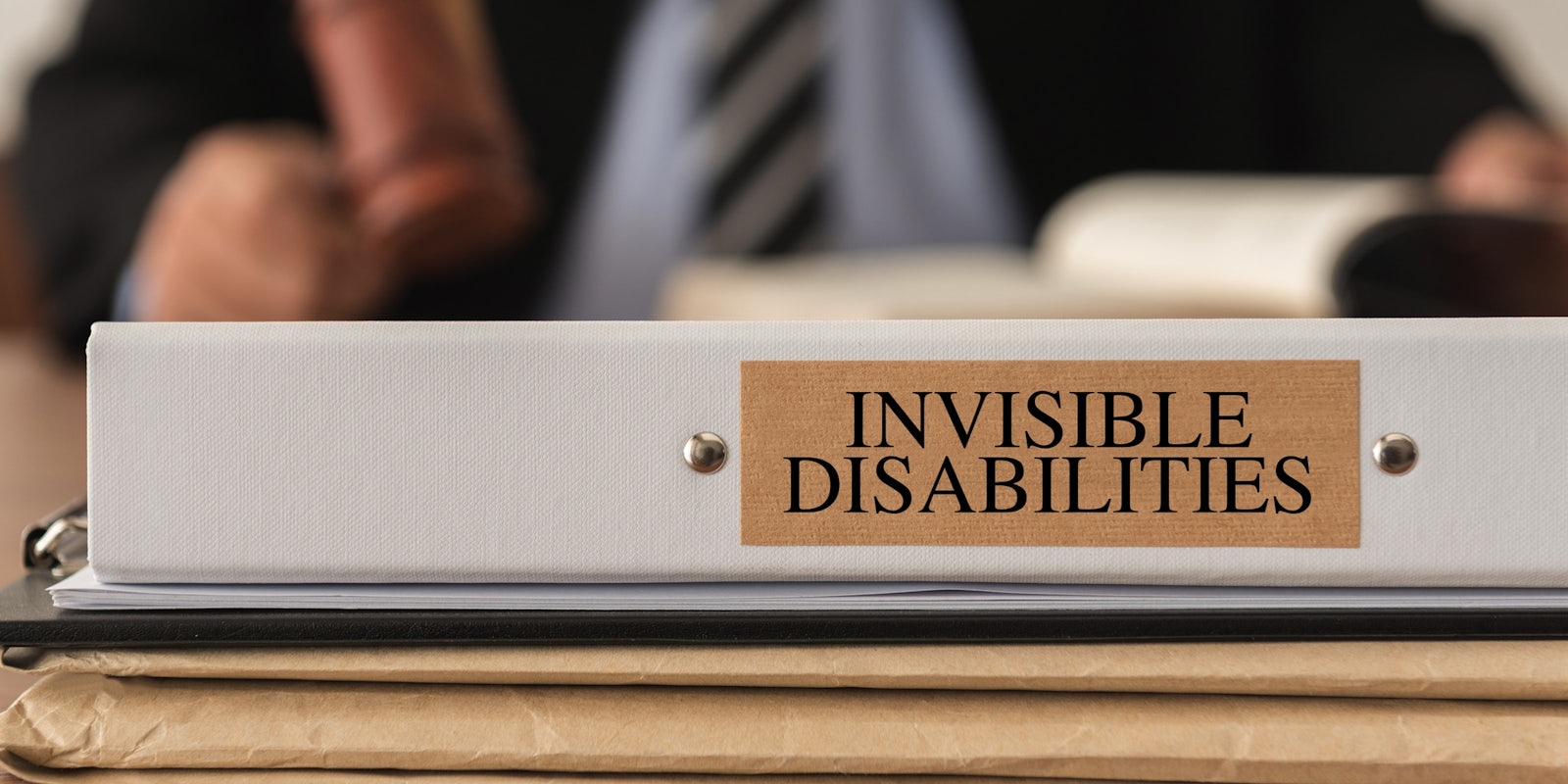It would seem like a lived experience is not something that could be trademarked. And yet, the legal system is a bizarre place.
Apparently, the phrase “invisible disabilities”—which often describes an “unseen” range of conditions like lupus, Crohn’s disease, and bipolar disorder—was trademarked in 2013, and a new petition is calling for that to be undone.
“We, disabled people and our allies, respectfully request the cancellation of the trademark ‘invisible disabilities’ by the US Patent and Trademark Office. (US Trademark Registration No. 4315808, April 2013.),” writes user “Jane DoeCrips” on petition.org. “No person or corporation should own or control our disabled identity or any other identity in terms of race, class, gender, or sexuality.”
The petition was started yesterday and, as of publishing, has 56 signatures. The movement appears to have begun on Facebook, when Facebook removed a post from another organization that used “Invisible Disabilities” in its name (the group asked not to be identified) after receiving a complaint from the owners of the trademark, the Invisible Disabilities Association.
The Invisible Disabilities Association (IDA) describes itself as an organization that “encourages, educates, and connects people and organizations touched by illness, pain, and disability around the globe.” It appears it was refused the trademark in 2012, but successfully filed for it a year later.
Shame on @InvDisabilities & @waynerconnell for trademarking #invisibledisabilities & harming other orgs https://t.co/wZdArCbtS7 #notabrand
— Grayson (he/him) (@GraysonGoal) August 9, 2016
https://twitter.com/whedonworship/status/762909812564844544
Do u have #invisibledisabilities? @InvDisabilities trademarked our identity & is trying to silence us. Let them know we're #NotABrand @uspto
— Lindsay Baran (@lindsay_baran) August 9, 2016
https://twitter.com/elizejackson/status/763029973422731265
IDA was founded by Wayne Connell, whose wife suffers from a chronic illness. “Wayne knew he wanted to spend the rest of his life with Sherri, even if it meant dealing with pain and suffering,” according to IDA’s site. “However, Wayne had no idea that his decision would lead to having a heart for all who live with chronic illness and pain.”
Deborah Hileman, a member of the IDA board of directors, provided a statement to the Daily Dot. “Like so many other nonprofits, we rely on our trademark to distinguish us from other organizations with nearly identical names but different goals. Without trademark protection, other organizations may intentionally or unintentionally use similar names, leading to confusion and the potential for damaged reputations or misdirected donations.”
However, as many have pointed out, “Invisible Disabilities Association” is not what’s trademarked—”invisible disabilities” is, which is a commonly used phrase.
Activist Michelle Gilman wrote about the distinction on Facebook. “The patent office (who have no clue about anything) doesn’t understand that trademarking ‘invisible disabilities’ is like trademarking ‘Native American’ or ‘African-American’ or ‘gay’ or ‘transgender’ or any other identity category. One organization, or one man, cannot own the identity of millions of people.”
Hileman responded to some of these critiques on Twitter, but doesn’t seem to be answering many questions.
https://twitter.com/Hilewoman/status/762702029974155264
Cheryl Green, a neurodivergent filmmaker and artist with non-apparent disabilities, told the Daily Dot over email she was enraged when she first found out about the trademark. “I’m OK with a company trademarking their name that includes that term. But this wasn’t a company name. This was a phrase that I use to identify myself,” she said. “Can you imagine trademarking ‘the Cancers’? What about trademarking ‘Autoimmune Disorders’?
“By trademarking a life experience and then trying to get others to not use a phrase that’s in common use,” she continues, “the organization and the government are doing what the disability community has always faced: telling us when to speak, when to be quiet, and what we should call ourselves.”
Green takes issue with a few other things regarding Connell and the IDA: “1) him asking for public praise for having the courage to marry a woman with invisible disabilities. How insulting to insinuate that it takes bravery to marry a disabled person, as if it’s so awful to be with us? 2) They do not prioritize Board or other leadership from disability community.”
Green hopes the petition reaches the U.S. Patent and Trademark office, and that they can proceed to cancel the trademark. “Everyday ableism and systemic ableism are toxic, and we feel that USPTO has reinforced ableism by granting usage of the term ‘invisible disabilities’ to an organization,” she said.

